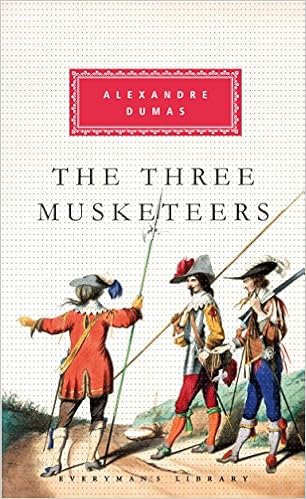Alexandre Dumas’s most famous tale— and possibly the most famous historical novel of all time— in a handsome hardcover volume.
This swashbuckling epic of chivalry, honor, and derring-do, set in France during the 1620s, is richly populated with romantic heroes, unattainable heroines, kings, queens, cavaliers, and criminals in a whirl of adventure, espionage, conspiracy, murder, vengeance, love, scandal, and suspense. Dumas transforms minor historical figures into larger- than-life characters: the Comte d’Artagnan, an impetuous young man in pursuit of glory; the beguilingly evil seductress “Milady”; the powerful and devious Cardinal Richelieu; the weak King Louis XIII and his unhappy queen—and, of course, the three musketeers themselves, Athos, Porthos, and Aramis, whose motto “all for one, one for all” has come to epitomize devoted friendship. With a plot that delivers stolen diamonds, masked balls, purloined letters, and, of course, great bouts of swordplay, The Three Musketeers is eternally entertaining.
The last Dumas I read was The Count of Monte Cristo, back in 2003 or so. I remember it having some long patches, some filler-material, but I also remember being enthralled by the sheer storytelling power, and finishing it in record time.
The Three Musketeers, I think, is better still. There's very little padding, and the only bit that rankled a little was a section in which the exposition was handled very stagily, in the sense of old-fashioned exposition: two nonentities come onto the stage and explain all the backstory in dialogue that is as flat as a pancake. In the section in question, however, the two characters were important ones, and it seemed odd how they suddenly began to behave. It was around this section too that D'Artagnan started behaving rather strangely, more like a puppet than a man. Not only was he using one woman to get at another, (Kitty, Milady's maid, to get at Milady) and showing uncharacteristic integrity, but his apparent bedazzlement by Milady was somehow unbelievable.
Apart from that, the story zips along at such a pace that you find yourself reading page after page, trying to keep up with the speed of things. The humour is wonderful, there's very little purple prose for a 19th century novel, and the characters, though occasionally inconsistent, are in general well-drawn. The villains are villains to the core; no mistaking them. The heroes will die for anything and everything that seems true. The women are wonderful, and the men passionate and energetic. And the suspense is terrific (even if you've seen one or two movie versions of the story).
Certainly the morals of the the characters leave something to be desired. Dumas even comments on their behaviour a couple of times by telling us that this was how people behaved then - as if to excuse the fact that he was making them behave this way. And the way he weaves history into his story - bending it when necessary - is excellent.

No comments:
Post a Comment